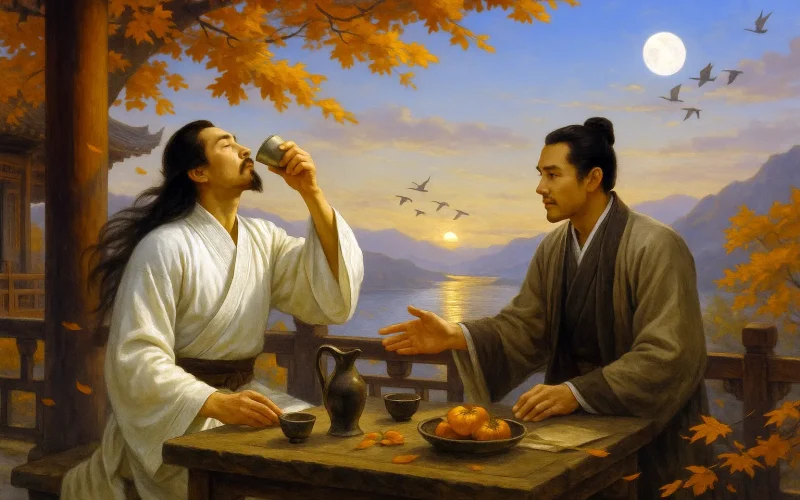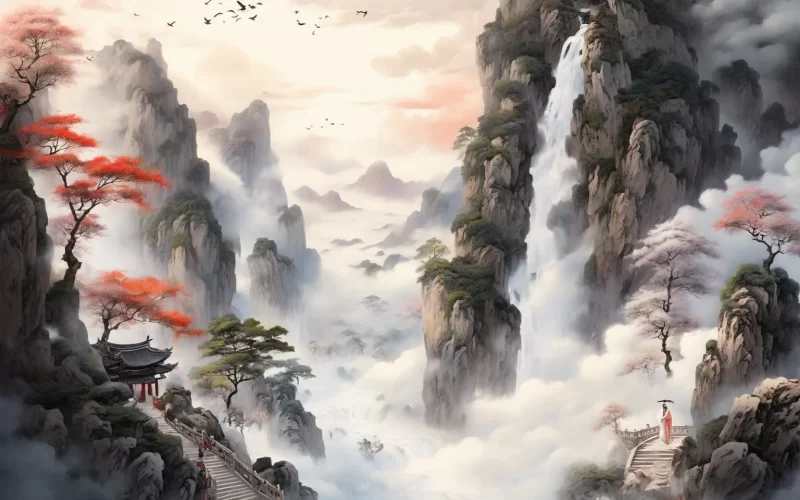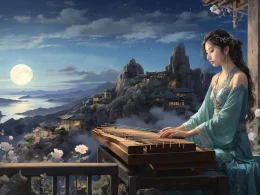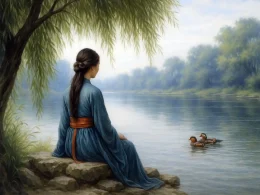Today has hurt my heart even more.
The autumn wildgeese have a long wind for escort
As I face them from this villa, drinking my wine.
The bones of great writers are your brushes, in the School of Heaven,
And I am a Lesser Hsieh growing up by your side.
We both are exalted to distant thought,
Aspiring to the sky and the bright moon.
But since water still flows, though we cut it with our swords,
And sorrows return, though we drown them with wine,
Since the world can in no way answer our craving,
I will loosen my hair tomorrow and take to a fishing-boat.
Original Poem
「宣州谢朓楼饯别校书叔云」
李白
弃我去者昨日之日不可留;
乱我心者今日之日多烦忧。
长风万里送秋雁, 对此可以酣高楼。
蓬莱文章建安骨, 中间小谢又清发,
俱怀逸兴壮思飞, 欲上青天览明月。
抽刀断水水更流, 举杯销愁愁更愁。
人生在世不称意, 明朝散发弄扁舟。
Interpretation
Composed during Li Bai's travels in Xuancheng (modern Anhui) around the late Tianbao era (circa 755 CE), on the eve of the An Lushan Rebellion, this farewell poem reflects the underlying crises beneath the Tang Dynasty's golden age. Having passed fifty years of age and weathered life's vicissitudes, Li Bai faced intensifying conflict between ideal and reality. While ostensibly a farewell piece, the work uses wine as a medium to express profound anguish over time's passage and unrecognized talent, alongside an unrestrained pursuit of spiritual liberation.
First Couplet: "弃我去者昨日之日不可留;乱我心者今日之日多烦忧。"
Qì wǒ qù zhě zuórì zhī rì bùkě liú; luàn wǒ xīn zhě jīnrì zhī rì duō fányōu.
Yesterdays that left me cannot stay; Todays that disturb me bring dismay.
The poem opens with an eleven-character prose-like line, resembling a prolonged sigh that directly expresses inner turmoil. The repetition of "day" intensifies time's relentless passage and persistent anxiety. This transcends mere farewell to become a summative outburst against life's predicaments, establishing the poem's turbulent emotional tone.
Second Couplet: "长风万里送秋雁,对此可以酣高楼。"
Chángfēng wànlǐ sòng qiū yàn, duì cǐ kěyǐ hān gāolóu.
Long winds escort autumn geese afar; Facing this, we drink high at the bar.
Mood shifts abruptly from worry's mire to vast horizons. The majestic imagery of "long winds and autumn geese" contrasts with the boldness of "drinking high", creating immense emotional tension that showcases Li Bai's distinctive leaping thought pattern and his liberated spirit seeking solace in nature. This scene serves both as actual farewell setting and symbol of the poet's broad-mindedness.
Third Couplet: "蓬莱文章建安骨,中间小谢又清发。"
Pénglái wénzhāng Jiàn'ān gǔ, zhōngjiān Xiǎo Xiè yòu qīngfā.
Your prose has Penglai's depth, Jian'an's spine; Between them, my verse flows like Xie's line.
This couplet ingeniously connects both participants and location. "Penglai literature" alludes to Han dynasty archives, metaphorically praising Li Yun's elegant prose as a court librarian; "Jian'an bone" commends his vigorous style; "Little Xie" (Xie Tiao) naturally associates with Xie Tiao Tower, allowing Li Bai to compare himself to the earlier poet, expressing admiration while confident in his own fresh, spirited talent.
Fourth Couplet: "俱怀逸兴壮思飞,欲上青天览明月。"
Jù huái yìxìng zhuàng sī fēi, yù shàng qīngtiān lǎn míngyuè.
Both soaring with transcendent delight, We'd reach blue sky to grasp moonlight.
The poet's imagination breaks from reality into gorgeous fantasy. "Ascending blue sky" and "grasping bright moon" symbolize ultimate pursuit of brightness and purity. Emotion peaks here, revealing Li Bai's characteristic romanticism and sublime disdain for worldly vulgarity.
Fifth Couplet: "抽刀断水水更流,举杯销愁愁更愁。"
Chōu dāo duàn shuǐ shuǐ gèng liú, jǔ bēi xiāo chóu chóu gèng chóu.
Draw sword to cut water—flow persists; Lift cup to drown sorrow—sorrow resists.
Emotion plummets from fantasy's heights to reality's abyss. These novel, apt metaphors possess striking originality. "Drawing sword to cut water" symbolizes futility and powerlessness against reality's troubles; "lifting cup to drown sorrow" reveals the futility and counterproductivity of alcoholic numbness. Strong contrast and anadiplosis render the inescapable, irresolvable extreme anguish vividly palpable.
Sixth Couplet: "人生在世不称意,明朝散发弄扁舟。"
Rénshēng zàishì bù chèngyì, míngzhāo sànfà nòng piānzhōu.
Life seldom brings satisfaction true; Tomorrow, hair loose, I'll sail canoe.
This is a resolute outcry after anguish peaks. "Loose hair and tiny boat" is a classic image of rejecting fame and indulging eccentricity—not genuine serenity but a rebellious posture blending indignation and pride. This final "liberation" scheme brims with bleakness after ideals shatter and helplessness, forming a heroic lament for a lost path
Holistic Appreciation
The poem's emotions surge and fall, its structure expands and contracts dramatically. The poet's mood swings violently between time's pressure, reality's troubles, and ideal's flight, ultimately leading to heroic alienation and exile through sorrow's irresolution. The language flows unrestrained like a rushing river, yet contains exquisite internal logic in its transitions, perfectly showcasing Li Bai's unique artistry: "natural as lotus rising from clear water, unadorned" yet spirited and unbridled.
Artistic Merits
- Unpredictable Emotional Structure: The emotional flow isn't linear but leaps like stream of consciousness, authentically reproducing the poet's complex, agitated inner world.
- Natural and Subtle Use of Allusion and Wordplay: The poem employs classical allusions such as "Penglai," "Jian'an," and "Little Xie" (referring to Xie Tiao) that seamlessly integrate with both the characters' identities and the physical setting, while simultaneously deepening the poetic meaning—all achieved with complete naturalness and absence of artifice.
- Novel, Original Metaphors: The unprecedented "drawing sword to cut water" metaphor concretizes abstract sorrow, vividly conveying its endless, unseverable helplessness, becoming an immortal line.
Insights
This poem profoundly reveals the spiritual dilemma and transcendence of a talented individual confronting reality's barriers. It teaches that while life's "dissatisfaction" may be the norm, the spirit's "soaring inspiration and bold thought" can overcome all obstacles. Li Bai's choice reminds us that when real-world paths are blocked, maintaining inner independence and purity—even adopting the resolute posture of "loose hair and tiny boat"—constitutes adherence to self-worth and unyielding pursuit of freedom. This boldness emerging from despair renders the poem sorrowful yet undefeated, tragic yet sublime, eternally inspiring later generations seeking paths through difficulties.
Poem translator
Kiang Kanghu
About the poet

Li Bai (李白), 701 - 762 A.D., whose ancestral home was in Gansu, was preceded by Li Guang, a general of the Han Dynasty. Tang poetry is one of the brightest constellations in the history of Chinese literature, and one of the brightest stars is Li Bai.












